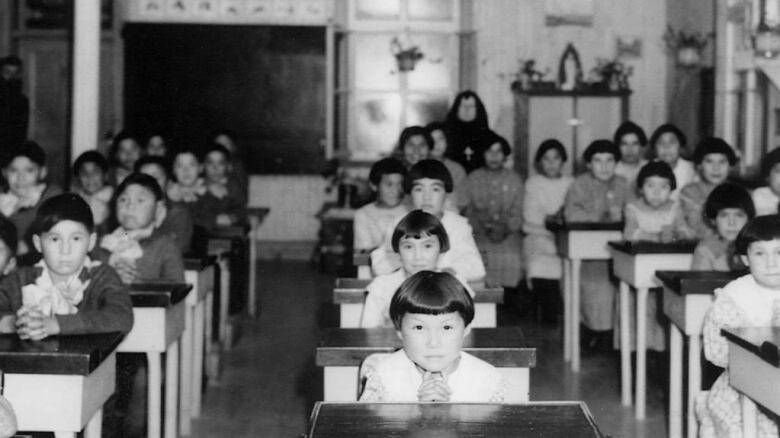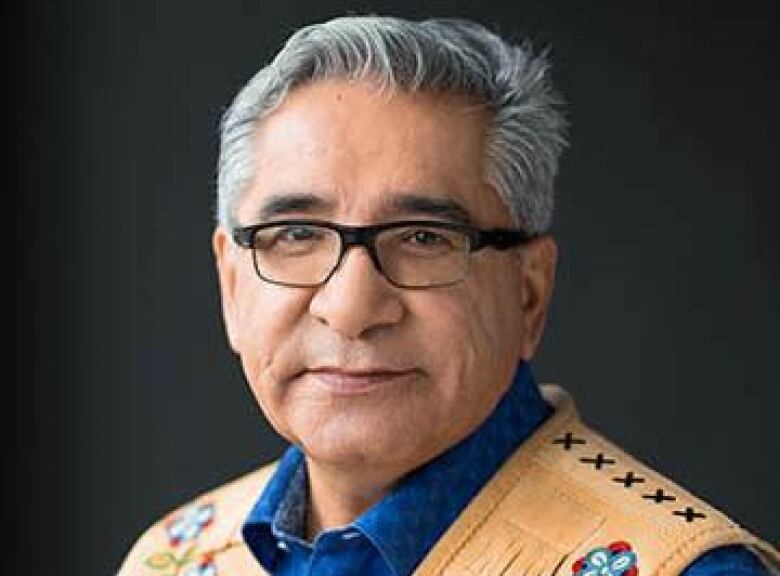In Quebec, First Nations seek community consultation before searching former residential school sites
Leaders want to move ahead cautiously after discovery of remains in Kamloops

WARNING: This story contains details some readers may find distressing.
Lucien Wabanonik was 12when he was sent to the residential school at Saint-Marc-de-Figuery, near Amos, Que.
"I've seen a lot of things there and not very good things, I would say," Wabanonik said in an interview.
"A lot of people are still living with those consequences. It's intergenerational consequences."
Last month's discovery of what are believed to be the remains of an estimated 215 children at the site of a former residential school in Kamloops, B.C., has renewed questions about what could be found in Quebec.
The final report by the Truth and Reconciliation Commission in 2015 identified 3,200 children who died as a result of residential schools, including 38 in Quebec. Indigenous leaders and other experts say the true figure could be far higher.

Now a band councillor for the Anishinaabe Nation of Lac Simon, Wabanonik says there should "absolutely" be searches done on the site of the former Catholic institution in the Abitibi-Tmiscamingue region.
The school operated from 1955-73, but is today little more than a field of ruins.
Wabanonik says any actions need to be planned carefully, with an eye to providing support to community members who are survivors, or who may have lost loved ones to residential schools.
"We need to prepare them for that because it's going to be a hard process," Wabanonik said."We need to be careful what we do."
Across the province, there were six residential schools, as well as several day schools and federal hostels.
- Do you have information about residential schools? Email your tips to WhereAreThey@cbc.ca.
In interviews this week, several First Nations leaders in Quebec said they are open to searching the grounds of former residential schools in the province.

But many stressed they want to plan the next steps in consultation with their communities and among each other first.
Wabanonik said the discovery in Kamloops touched a painful nerve with many in his community still dealing with the impact of residential schools on their own lives.
"We were all scattered," he said. "Children taken away without their consent, the families were broken."
'We do hear the stories'
On the eastern shore of James Bay, the community of Chisasibi is setting up a committee to determine next steps.
Cree Grand Chief Abel Bosum saysconsultation with other Cree communities is still needed.
The residential school sites near Chisasibi are on Fort George Island, the location of the Cree community before it moved in 1981 due to the James Bay hydroelectric development.

"Many of the children who went to Fort George were from other communities," he said. "We do hear the stories. We know the stories."
The Anglican institution, called St. Philip's Indian Residential School, operated from 1933-75.
Students at the school lacked access to food and fresh water given its remote location, according to the National Centre for Truth and Reconciliation at the University of Manitoba, which documents the history of Canada's residential schools.
Fire ravaged the institution in 1943. It was rebuilt, but "was in deplorable shape and overcrowded" by the mid 1950s, according to the centre.
It lists the names of 10 children who died while attending the institution in the 1940s.
The other residential school on Fort George, run by the Catholic Church, which operated from 1937-81, has six known victims.
Few traces of the Fort George residential schools remain, but survivors conduct an annual mourning ceremony on the island to honour those who were lost, including missing children, Bosum said.
Discussions ongoing
Bosum himself attended the Anglican residential school at La Tuque, which operated from 1963-78, near the Atikamekw communities of Wemotaci and Manawan and about 225 kilometres west of Quebec City.
The school was demolished in 2006, with busloads of former students from Cree communities on hand to witness it.
Rjean Nquado, a spokesperson for Grand Chief of the Atikamekw Nation Constant Awashish, said even though the site is closest to Atikamekw territory, most of the school's students were Cree.
Nquado said the Atikamekw are ready to support families in searches, if that is what's requested.
The National Centre for Truth and Reconciliation lists one death at the La Tuque residential school Juliet Rabbitskin, who died in 1966.
According to the testimony of fellow student Mary Coon-Come at the TRC, Rabbitskin died of an illness, and the girl's parents were not invited to her burial.
"[There] were only five people there," she said.
In the Lac-Saint-Jean region, Mashteuiatsh First Nation Chief Clifford Moar said his community is also considering what to do regarding the Pointe-Bleu residential school.
Moar said he is "very open to making sure that research is done for the sake of the families that lost children and loved ones during that time."
In Maliotenam, a First Nations community near Sept-les, there are also ongoing discussions.
According to council spokesperson, Jean-Claude Pinette-Therrien, Uashat-Maliotenam First Nation Chief Mike McKenzie says "everything will be done" to bring comfort to affected families and to have their questions answered.
Quebec's Indigenous Affairs Minister Ian Lafrenireannounced Saturdayelders from Indigenous communitieswill be part of a "consultation circle" with the provincial and federal governmentstodetermine what comes next in the search for remains of residential school victims.
Support is available for anyone affected by the effects of residential schools, and those who are triggered by the latest reports.
TheIndian Residential School Survivors Society(IRSSS)can be contacted toll-free at1-800-721-0066.
A national Indian Residential School Crisis Line has been set up to provide support for former students and those affected. People can access emotional and crisis referral services by calling the24-hour national crisis line: 1-866-925-4419.












_(720p).jpg)


 OFFICIAL HD MUSIC VIDEO.jpg)
.jpg)



























































































